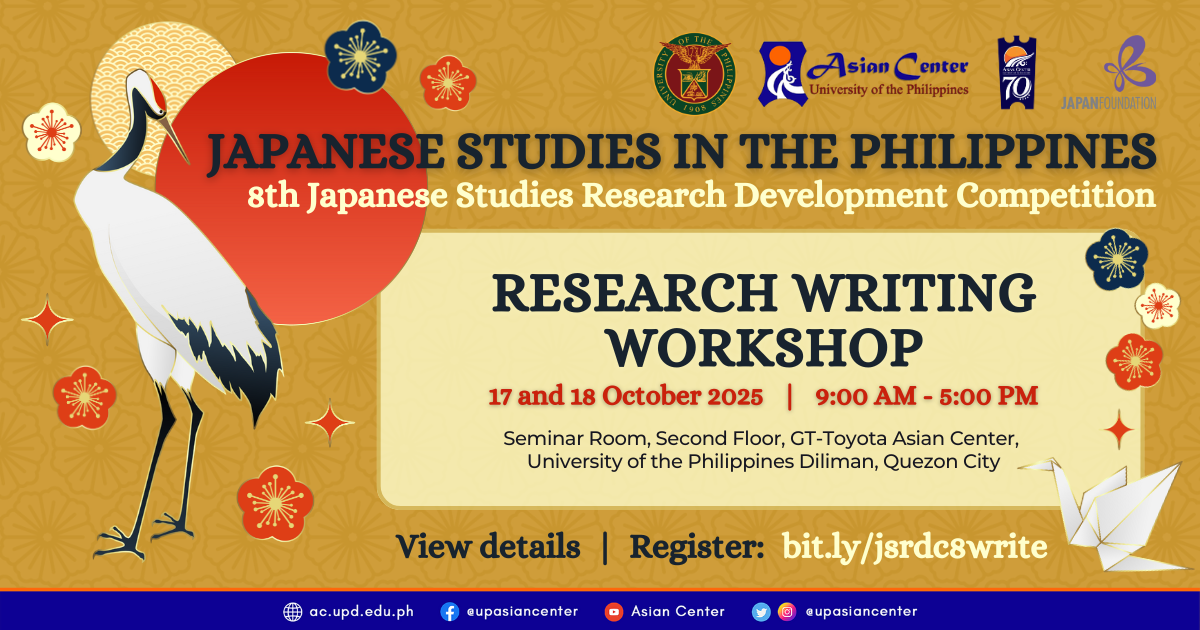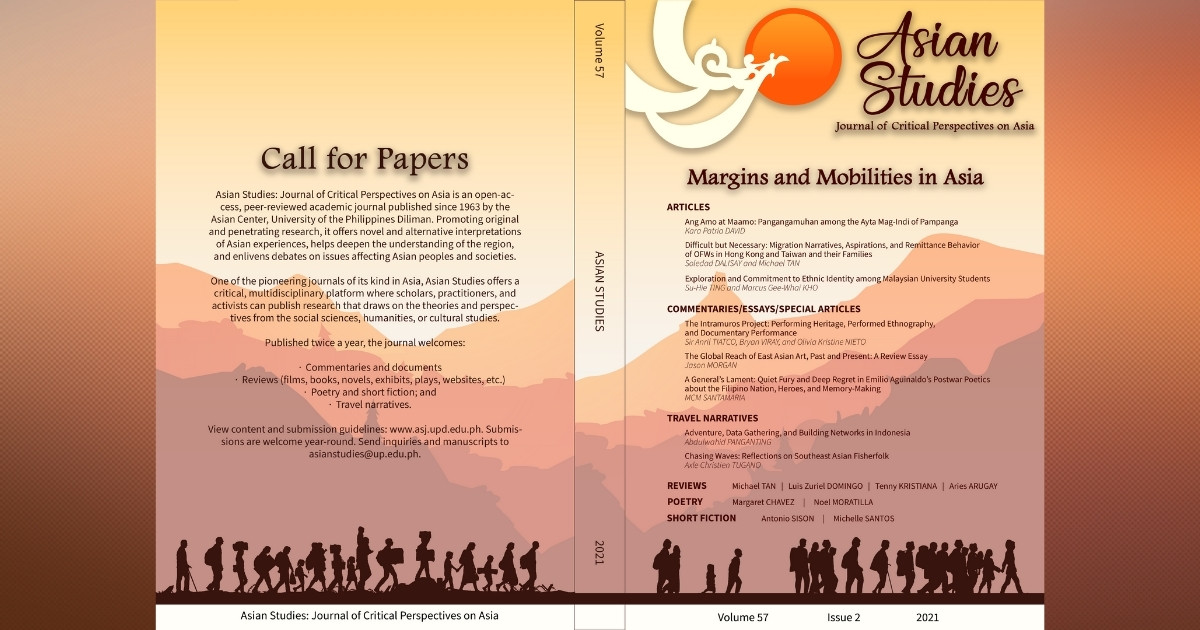The UP Asian Center and the Japan Foundation Manila will hold a Research Writing Workshop on 17 - 18 October 2024, 9:00 AM - 5:00 PM (GMT+8), ONSITE at the Seminar Room, GT-Toyota Asian Center, UP Diliman. The event is free and open to the public.
ABOUT THE KEYNOTE SPEAKERS AND HIS PRESENTATIONS
Doing Research on Japan by a Non-Japanese Speaker in Japan
My proficiency in Japanese is elementary. I can order food, ask for directions, and hold a very basic conversation; however, my research focuses on Japan's foreign policy towards Southeast Asia. Some people criticise my language skills, saying that this could prevent me from acquiring information in Japan and might hinder me from developing strong research integrity. I was in Japan for my Ph.D. research project between February and March 2016. I interviewed people there. As my academic background is in International Relations, my interviewees are English-speaking people and they do have a great understanding of cross-cultural communication. In this talk, I will share my personal experience on my research field trip. How I survived by not having an AI back then, and how to finish my project. I propose that with the current technological advancement and AI application, one can utilise applications to help gather information and data. It helps prepare people for field research. This talk will help you have ideas to prepare yourself more.
Doing Research on Japan by a Non-Japanese Speaker in Japan
Recent developments that caused a political stir in infrastructure projects administered by the Department of Public Works and Highways (DPWH), particularly in flood control posed an inquiry on the resilience of transactional processes that govern big-ticket flagship projects. Foreign-assisted projects in the past years also covered flood control projects in identified cities and provinces in the country, with DPWH as the counterpart implementing agency. Japan’s official development assistance through the Japan International Cooperation Agency was another pathway of funding flood control projects, before these were allocated program funds under the General Appropriations Act (GAA), otherwise known as the annual budget. The ex-ante and ex-post audits conducted in Japan-assisted flood control projects deserve a revisit to draw lessons from in ensuring transparency from the procurement, supply and implementation of designed flood control plans. The differences in the two pathways of funding, along with the accompanying processes from the budget, procurement supply chain and management may open yet another Japan ex-post audit practice that deserve greater attention and further study.
NARUT CHAROENSRI, Ph.D.
Professor, Chiang Mai University, Thailand
Dr. Narut CHAROENSRI is an Assistant Professor of International Relations at the School of International Affairs, Faculty of Political Science and Public Administration, Chiang Mai University (CMU), Thailand. He earned his BA in International Affairs from Thammasat University, an MA in International Relations from Chulalongkorn University, and a PhD in Japanese and Southeast Asian Studies from the University of Leeds, UK. His Ph.D. thesis is entitled“Regional Intellectual Hegemony and Regional Connectivity: Japan's Norms of Development, International Research Organisations and Network-Building in Southeast Asia.” His research focuses on the geopolitics of East Asia, with particular emphasis on the Mekong Subregion, including economic corridors and Southeast Asian regionalism. Narut teaches courses such as Mekong Subregion Studies, International Relations Theory, Comparative Regionalism, East Asian Studies, and Cities in Global Politics. His recent publications relating to Japan include: "ASEAN in the Eye of Japan" (2024); "Scenarios for Statecraft: Strategic Thinking for Communication and Negotiation in the International Arena" (2023); "Cities in International Connectivity" (2022); "The Clashes Within: How Do the Thai Government Agencies and NGOs View China’s Rise?" (2024). In 2024, he published two book chapters, "Aged Society and Japan’s Social Dynamics," and "Japanese Studies and the Study of Changes," which appeared in Unpacked Japanpublished by the Japan Watch Project.
ABOUT THE LECTURERS AND THEIR PRESENTATIONS
Japanese Proletarian Literature in Filipino: Takiji Kobayashi's Kanikosen in Filipino
The paper relates my experience in translating to Filipino (from Japanese) Takiji Kobayashi’s 1933 proletarian novel Kanikōsen. Japanese proletarian literature during the time, particularly the interwar period (1920s to 1930s), is analyzed in this paper and is compared with the same period’s literary and class struggles in the prewar Philippines. The paper thus draws influence from the transversive practice, in the anthropological sense, by situating imperial Japan upon the Southeast Asian critic’s gaze. While translating the Japanese novel into the language of a Southeast Asian nation (Philippines) can already be considered as a major de/centering act, such translation also makes the theoretical connection between literature and society complete. Kobayashi’s body of works, translated to at least seven languages (all Western, excluding Chinese), has indeed been studied by historians and literary critics like Heather Bowen-Struyk, Benjamin Robert Burton, and Norma Field. They, however, fail to situate these in the context of literary and class struggles in Asia and Southeast Asia, the very region that was to take a major role in the regional and global conflict beginning in the mid-1930s. The paper thus aims to provide such political-economic context while also relating the experiences of Filipino proletarian writers of the same period. On a more contemporary take, the surge in interest on Kobayashi within Japan is generally attributed to the dissatisfaction among the country’s working-class population brought about by the global financial crisis. It is of interest how Kobayashi’s works can be appreciated in developing countries like the Philippines.
GONZALO A. CAMPOAMOR II, Ph.D.
Professor, Asian Center, UP Diliman
Gonzalo Campoamor, Ph.D. is a Professor at the Asian Center, UP Diliman. He previously served as an Associate professor at the UP Department of Filipino and Philippine Literature . He completed his MA in Filipino in UP Diliman, and his MA and PhD in History at the Hitotsubashi University, Tokyo, where he was a Monbukagakusho (Japanese Government) scholar. Dr. Campoamor is also served as editor for several journals including Humanities Diliman, Science Diliman, and Social Science Diliman. He has several critical works that have been published in several journals including “Japanese Wartime Intellectuals: The Case of Miki Kiyoshi during the Japanese Occupation in the Philippines” (Asian Studies: Journal of Critical Perspectives in Asia, 2016), “Midya at Pasismo” (Media at Lipunan, 2014), and “Elias and the Rizalian Middle Class Imagination of Bonifacio and Revolution” (Salita ng Sandata: Bonifacio’s Legacies to the People’s Struggles, 2013). Dr. Campoamor has been a recipient of numerous awards, including the Sumitomo Foundation 2014 Grant for Japan-Related Research Projects, Japan Student Services Organization Follow-up Research fellowship (2013), and several UP Centennial Faculty Grants.
A Thousand Winds and A Thousand Versions: Examining the Appropriative Power of Arai Mitsuru’s Sen no Kaze ni Natten
Is it possible for a derived text to outshine an original? In 2006, a Japanese song proved this possibility to be true. In that year, Akikawa Masufumi’s rendition of Arai Mitsuru’s (aka Arai Man) Sen no Kaze ni Natte topped the charts in Japan’s music industry. It continued to remain as the best-selling single in 2007, reaching 1,115,499 copies in sales. This statistical accomplishment is not only remarkable for the fact that it was Akikawa’s debut recording for what followed could only be called an artistic spawning of various musical covers by other artists, instrumental renditions, and choral arrangements. The artistic inflorescence or blooming of Sen no Kaze ni Natte illustrates the power of cultural appropriation. The lyrics of the song was based on a popular elegiac poem written by Clare Harner, which was published in 1934.
This haunting poem became the basis for Arai’s most uplifting composition, which in turn was appropriated by various artists of various genres, languages and cultures. Of particular note is Haley Westenra’s version titled A Thousand Winds. What are the sources of Sen no Kaze ni Natte’s appropriative power? What inspires better the uta ( ) that is the song or the uta ( ) that is the poem? Does the power rest in the double entendre that is the uta ( ) that is both the song and the poem? Is it the translatable nature of both textual composition of the poem and the musical composition of the song that allows for various interpretations and versions to emerge. Using methods gleaned from cyber ethnography, this research presents some answers found in the commentary sections of forums, blogs and chatrooms found in the Internet.
MATTHEW M. SANTAMARIA, Doctor of Law
Professor and UP Artist, Asian Center, UP Diliman
MCM (Matthew ConstancioMaglana) Santamaria is a Professor of Asian and Philippine Studies at the Asian Center, University of the Philippines Diliman. He received his Doctor of Law in Political Science from the Kyoto University Graduate School of Law in 1999. He holds the title of University of the Philippines Artist, and is also presentlya "One UP Professorial Chair" awardee. He has published many book chapters, articles and essays on the themes of ethnic conflict, Sama-Bajau ethnography, ritual and performance, and dance studies. Dr. Santamaria is also a practicing choreographer in the theatre arts. He has shown his choreographic works in Hanoi and NinhBinh, Vietnam; Honolulu and Lanai, Hawaii; Minsk, Belorussia; Phnom Penh, Cambodia; Shanghai, People’s Republic of China, Tainan and Taipei, Taiwan; and, Tokyo and Kyoto, Japan. He continues his advocacy in helping sustain Sama-Bajau traditional music and dance through the Bunga Arts Link (BAL), a performance group which he established in 2004. Through his work with the BAL, he has helped the Festival IgalAntarabangsa (FIA), a dance festival for the Sama-Bajau based in Semporna, Sabah, Malaysia. Through the BAL, he has also established the “Kulintangan Project,"a fund-raising endeavor for the purpose of purchasing kulintangan (graduated bossed-gong) music ensemble instruments for the Sama-Bajau diaspora communities in Luzon and the Visayas.
Japan-Assisted Flood Control Projects in the Philippines: Lessons from Ex-Post Audits
Recent developments that caused a political stir in infrastructure projects administered by the Department of Public Works and Highways (DPWH), particularly in flood control posed an inquiry on the resilience of transactional processes that govern big-ticket flagship projects. Foreign-assisted projects in the past years also covered flood control projects in identified cities and provinces in the country, with DPWH as counterpart implementing agency. Japan’s official development assistance through the Japan International Cooperation Agency was another pathway of funding flood control projects, before these were allocated program funds under the General Appropriations Act (GAA), otherwise known as the annual budget. The ex-ante and ex-post audits conducted in Japan-assisted flood control projects deserve a revisit to draw lessons from in ensuring transparency from the procurement, supply and implementation of designed flood control plans. The differences in the two pathways of funding, along with the accompanying processes from the budget, procurement supply chain and management may open yet another Japan ex-post audit practice that deserve greater attention and further study.
ALEXANDER MICHAEL PALMA, Ph.D.
Assistant Professor, Asian Center, UP Diliman
Dr. Alexander Michael Palma is an Assistant Professor at the UP Asian Center. His research interests revolve around the field of development studies across a diversity of sectors to include, health, and nutrition, local governance, trade, social entrepreneurship, environment, public finance, project evaluation and monitoring, institutional economics, energy, urban and regional development to name a few. Dr. Palma devoted more than twenty years in development work having been engaged in projects for the United Nations, the World Bank, Japan International Cooperation Agency, the European Union, and Japan Bank for International Cooperation He has also been actively promoting the cause of health and nutrition ofchildren, trade and investment, public finance management, housing, education, civil identity and rights, infrastructure development among others. Dr. Palma contributed works in Japan studies, and received citation for the researches in the fields of local government and decentralization policy. Dr. Palma authored public finance studies at the Philippine Institute of Development Studies or PIDS. He conducted a review of the President’s budget, which involved the analysis of the utilization of the health appropriation.
ABOUT THE WORKSHOP
Authors of semi-finalists of the 8th Japanese Research Development Competition will come together for the second phase of the competition. This three-day writing workshop aims to critique the papers through selected reviewers.
ABOUT THE COMPETITION
The research competition aims to encourage Japan-related research among Filipino students, to disseminate knowledge and exchange perspectives on Japanese Studies. The public forum and research competition features paper presentations from undergraduate and graduate students in the Philippines. The event is organized by the UP Asian Center and the Japan Foundation, Manila
ABOUT THE ORGANIZERS
The research competition is organized by the UP Asian Center and the Japan Foundation, Manila. It aims to encourage Japan-related research among Filipino students, to disseminate knowledge, and exchange perspectives on Japanese Studies.
For inquiries, please email This email address is being protected from spambots. You need JavaScript enabled to view it. or call 8 981 8500 local 3586.
The Asian Center, University of the Philippines Diliman offers M.A. degrees in Asian Studies with four fields of specialization: Northeast Asia, Southeast Asia, South Asia, and West Asia. The UP Asian Center also has an M.A. program in Philippine Studies that allows students to major in Philippine society and culture, Philippine foreign relations, or Philippine development studies. It also offers a Ph.D. program in Philippine Studies in conjunction with the College of Arts and Letters and the College of Social Sciences and Philosophy. For an overview of these graduate programs, click here. As an area studies institution, the Asian Center also publishes Asian Studies: Journal of Critical Perspectives on Asia, the latest issue of which can be downloaded at the journal's website. For other news and upcoming events at the Asian Center, click here.










